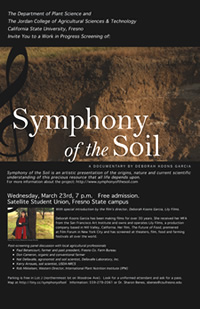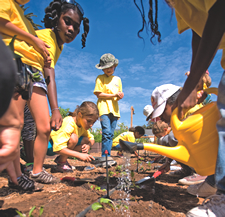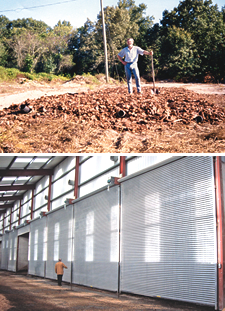BioCycle March 2011, Vol. 52, No. 3, p. 25
 Symphony Of The Soil
Symphony Of The Soil
BioCycle Global 2011 keynote speaker Deborah Koons Garcia is no stranger to this year’s conference plenary theme of “Healthy Soils, Community and Planet.” A practicing vegetarian since the early 1970s, the award-winning filmmaker knows that the farmers who coax sustenance from the earth share a deep connection with the soil. Her groundbreaking film The Future of Food (2004) stirred the international debate about genetically modified foods, earned several awards and helped pioneer the food and farming documentary genre. Garcia’s current undertaking, Symphony of the Soil, is a multifilm documentary and web-based project exploring the soil community from the microscopic to the global.

Symphony of the Soil includes a feature-length documentary and an accompanying group of short films that examine select soil topics in greater depth. With the help of renowned scientists, the films explore soil as a protagonist of the planetary story, including the birth of soil, its life cycle, the myriad creatures making up the soil community (including us), nutrient cycling and other biological processes such as the carbon cycle, the nitrogen cycle and succession. Humans are indeed an integral part of the soil community, Garcia explains in a September 2010 YouTube interview. “We rise up from it, and we go back to it,” she says. “We’re part of it, and when we’re responsible members of the soil community and we give back to the soil it gives back to us. That’s the change a lot of us are in the process of making, and when people see this film they’ll actually become more committed to a positive relationship with soil.” Filmed on four continents and drawing from both ancient knowledge and cutting edge science, Symphony of the Soil is an artistic presentation illustrating the possibilities of healthy soil creating healthy plants creating healthy humans living on a healthy planet.
Deborah Koons Garcia received her MFA from the San Francisco Art Institute and has been making films for more than 30 years. Her production company, Lily Films, is based in Mill Valley, California. Find out more at www.lilyfilms.com.
Video Celebrates Global Organics Recycling
BioCycle is assembling a multimedia presentation of international resource recovery initiatives to be featured at the BioCycle Global 2011 conference April 11-14, 2011 in San Diego. The montage of video clips, still images, music and narrative will reflect the Opening Plenary theme “Healthy Soils, Communities and Planet.” The production highlights projects around the world recycling materials from the organic waste stream to replenish depleted natural resources essential to supporting the world’s population. We’ve gathered an assortment digital images and video footage for a global snapshot of sites and innovative organics recycling projects to be featured onscreen between presentations.

Olivewood Gardens Grows Healthy Communities
Olivewood Gardens and Learning Center, part of the International Community Foundation, is a community and garden resource facility in National City, California. Started in February 2010, Olivewood Gardens is located on a unique 6.5-acre property donated to the foundation by the Walton family in 2006 and later gifted to Olivewood Gardens. “We are a team of mostly volunteers including chefs and food professionals that donate their time to teach hands-on cooking classes, and master gardeners, scientists and educators who volunteer as field instructors to teach gardening classes,” explains Executive Director Amy Carstensen. “Children and parents explore connections between plants, history, science, art, literature, math and nutrition, where learning is centered within the context of organic gardens and a demonstration kitchen.” Fruits and vegetables are grown and harvested for nutrition classes, cooking demonstrations and environmental education workshops. Learning is centered within the context of organic gardens and a kitchen.
On Thursday, April 14, as part of the BioCycle Global Conference Field Trip, participants will have an opportunity to observe Olivewood Gardens and its classes in action. To sign up for the tour, visit www.biocycleglobal.com. And a virtual tour is available on the Gardens’ website, www.olivewoodgardens.org.
Draft Eir For Ad Facilities
To assist in the siting and permitting of anaerobic digestion (AD) facilities to process the organic fraction of municipal solid waste in California, CalRecycle recently released its Draft Program Environmental Impact Report (EIR) for public comment. “This is an effort by CalRecycle to use its very limited funding to analyze the potential environmental impacts of AD facilities, which is but one of the conversion technologies available to reduce the level of organics going to landfills in California,” states the introduction. “The Program EIR is a starting point of the environmental review of AD facilities proposed in local jurisdictions.” The public comment period ends April 4, 2011.
In-vessel AD facilities located at existing or new permitted solid waste facilities or stand-alone AD projects in areas zoned for industrial or solid waste handling activities are included in the scope. Dairy manure digesters, dairy manure codigesters and wastewater treatment plant digesters are not included. The draft program EIR allows for flexibility in technology choices at the local level. Feedstocks included are food waste, green material and mixed solid waste. On Tuesday, April 12, 2011, a presentation on the Draft EIR will be given by Ken Decio of CalRecycle. To download a copy and learn where to submit comments, visit http://calrecycle.ca.gov/ SWFacilities/ Compostables/AnaerobicDig/.
Celebrating 20 Years Of Organics Recycling
Early in 1991, when Jim McGill and Noel Lyons founded North Carolina-based McGill Environmental Systems, both were so busy trying to figure out how to turn composting into a real business that neither made note of the actual start-up date. But the Irish-born partners did mark the passing of St. Patrick’s Day, so March 17 became the official anniversary date for McGill. This year, nearly 100 McGill employees on both sides of the Atlantic raised their glasses in a collective toast to mark the company’s 20th anniversary.
From the beginning, McGill has relied on a modified version of the Rutgers University-developed aerated static pile composting method to efficiently and reliably process everything from wood waste to biosolids to biodegradable plastics. The physical plant, however, has changed dramatically over the years. McGill’s first composting “facility” was a small, open-air pad of perforated piping topped with wood chips. It had one customer – a major poultry producer – and the sole feedstock was poultry litter. Shortly thereafter, the operation moved into an open-sided shed. Later, plywood walls were added, then a channeled concrete floor, followed by concrete walls, followed by larger aeration fans, followed by a biofilter. When the sixth McGill facility opened in 2008, concrete-encapsulated bays – which offer tight environmental security and the ability to site closer to feedstock intake and compost markets – had replaced open-bay processing.

Today, McGill still processes the occasional load of poultry litter, but its active customer list now tops 200. McGill partner Noel Lyons joins a BioCycle Global 2011 conference panel discussion on “Global Stewardship of Organics” Wednesday, April 13, in San Diego and will speak on the topic “100 Percent Organics Diversion – Is The Composting Industry Ready?”
CDFA Holding Workshop On AB 856 Compliance
Assembly Bill 856 was introduced in response to the California Department of Food and Agriculture’s (CDFA) investigation of an organic fertilizer manufacturer adulterating liquid fertilizer with an unapproved ingredient. CDFA, in consultation with the Fertilizer Inspection Advisory Board (FIAB), reviewed the incident and identified gaps in CDFA’s authority to regulate fertilizing materials used for organic crop and food production. AB 856 is intended to address industry concerns regarding fertilizing materials used as inputs in the production of organic food and crops under the USDA National Organic Program (NOP).
The main goal of AB 856 is to ensure integrity and composition of organic input materials (OIM). Provisions include: Defining OIM as material to be used in organic crop and food production, excluding pesticides; Providing CDFA the authority to regulate OIM manufactured and distributed in or into California; Requiring OIM labels be reviewed and registered with CDFA to ensure compliance with NOP standards; and Authorizing CDFA to conduct onsite inspections of OIM manufacturing processes and take samples at various stages of OIM production.
CDFA will host a morning workshop on the new rule at the BioCycle Global 2011 conference Thursday, April 14. The workshop will provide a summary of AB 856, explain licensing and label registration of OIM, review CDFA’s inspection protocol and explore how to use the department’s online database. There is no fee to attend. To register, and for more information, contact Luz Roa at CDFA: LRoa@cdfa.ca.gov.
Clean Local Energy Now
To accelerate the creation of clean energy jobs in California, newly elected Governor Jerry Brown has called for 60 percent of new renewable energy systems (12,000 megawatts) to be installed locally in the state’s communities over the next 10 years. Existing local policies are largely limited to energy projects that help homeowners and businesses reduce their electricity bills by offsetting energy purchases from a utility, explains Ted Ko of the Clean Coalition, a nonprofit organization. To take full advantage of the state’s renewable energy resources, “California needs to give community members the opportunity to develop clean energy projects that sell electricity directly to utilities,” says Ko. It developed a set of proposals, titled Clean Local Energy Accessible Now for California (CLEAN California), to make it easier to site, contract, approve and finance projects.
The proposals, which may have applicability in other states, include: Giving regulators the tools to support the growth of the wholesale distributed generation market, which is comprised of 20 MW and smaller renewable energy systems that connect to the distribution grid; and Requiring utilities to enter into standard “CLEAN contracts” to purchase all energy from eligible systems at specified rates for 20 years. For 5 MW and smaller projects, rates would be predefined to maximize simplicity and encourage broad participation. Craig Lewis, Clean Coalition’s Executive Director, will be speaking on Wednesday, April 13 at BioCycle Global 2011.
March 23, 2011 | General










